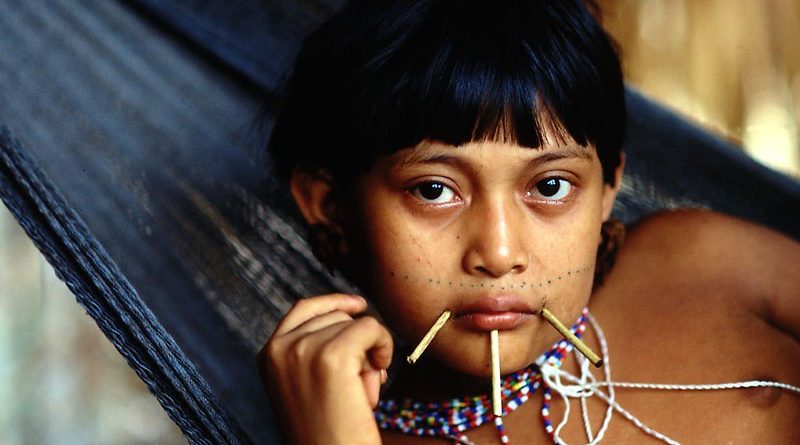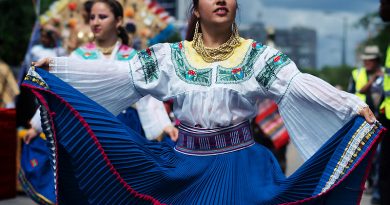Yanomami Tribe
Culture Facts
Where: Amazonas, Southern Venezuela, South America
Who: An Amerindian tribe once described as fierce, war mongering people
Culture: Wearing little clothing, these are jungle people who are both gardeners and hunters who gather and kill a rich array of foods from the jungle.
Yanomami – The Fierce People?
It was not until the eighteenth century that the first westerner European explorer, Alexander Humboldt, encounter the Yanomami. He described them as a dangerous war mongering people and their reputation has changed little since this time.
The Yanomami are just one of the Amerindian tribes that inhabit the thick rainforests of the most southernmost state in Venezuela, Amazonas. And like their fellow Amazonian-Indian tribes, the lives of the Yanomami have been touched very little by the turbulent events that have characterized their country’s history – to the extent that they have come to be regarded by many as living anthropological artifacts. Moreover, the Venezuelan government are not blind to the cultural importance of tribes like the Yanomami, and Yanomami lands have been declared off limits apart from to those who have written permission. Although it’s highly possible that the Yanomami need not live in too much fear of a being over-run by camera clicking tourists, considering their reputation for intense ferocity and machete wielding.
However, in recent years some people have suggested that the Yanomami are perhaps not as deserving of the title ‘the fierce people’, given to them by the American anthropologist Napoleon Chagnon, as they were once thought to be. In reality the Yanomami live quite peacefully on the whole and are more likely to approach outsiders with curiosity than with a huge, bloodstained machete.
Yanomami Dress
You only have to look into the way the Yanomami people adorn themselves to discover deeper aspects of the tribe’s culture. Yanomami clothing is largely symbolic and decorative. The furthest that Yanomami men go to cover their modesty is to wear little more than string around their waist, to which they tie the stretched out foreskins of their penises. Within Yanomami society it is a clear indication that a boy has come of age when he begins to practice the custom of tying his penis to his waist string. Like their men, the Yanomami women also use cotton yarn to make what you might loosely term as clothing. They make pretty waistbands that look delightful but cover next to nothing, and halter-neck style adornments that cross between the breasts and the middle of the back.
Social Roles
Yanomami men and women perform very different and specific roles within their society. Men are the dominant force within and enjoy a much higher status than women, and yet for all this machismo it’s the women that get all the tough jobs and do the hard, physical labor. The women, not the men, leave around 3pm or 4pm everyday to travel miles to collect firewood and fetch water for the village, often returning in the late evening bearing enormous loads of wood in their pack baskets. Then after enduring hours of this backbreaking slog they are still expected to pander to the every need of their husbands. If they do not they risk being scolded, beaten, or something worse. On the positive side, the men do muck in from time to time. At feasts and ceremonial occasions it is the Yanomami men you will see slaving over a hot fire to produce a meal for the guests, while the women take a well-deserved rest.
Agriculture and Food
For food, the Yanomami eat most of what the jungle can offer, which is quite a wide variety of foods. They feast on all kinds off edible fare ranging from snakes, wild pigs, monkeys, deer, and jaguars to varieties of insects, larvae, fish, crabs, wild honey, plantain, sweet potato, and palm fruits. By world health standards, the Yanomami enjoy a high standard of living. Nevertheless the voracity of the Yanomami’s hunting practices has in the past been highly exaggerated, taking into account that upwards of eighty to ninety percent of the food eaten by the Yanomami tribes is from their gardens. Of course the Yanomami have to hunt to survive but they are equally – if not more – committed to the cultivation of their gardens. It has been debated that the Yanomami actually lack protein in their diet because they eat so much more fruit and vegetables than meat produce.
Recreational Drugs
Another Yanomami pastime that has been extensively documented is the tribe’s widely known use of recreational drugs. Their most favored drug of choice is natural hallucinogens that are generally referred to by the generic name of ebene. It is extracted in its raw form from various types of trees and plants, ground into powder form and mixed together with saliva. The men of the village usually make a batch of ebene everyday following a hard day’s gardening or hunting. The ritual goes that men paint themselves elaborately with red pigment, adorn themselves with feathers, and then gather around the front of the house of a chosen host. They then proceed to take turns in blowing powder into each other’s nostrils through a long hollow tube called amokohiro. Most of the men take great pleasure from indulging in this activity despite the not so pleasant side effects of vomiting and the intense pain that follows once the powder has been snuffed. However, despite the wide use of hallucinogens, by far the most popular natural drug amongst the Yanomami, to which men, women and children are all addicted, is tobacco. They chew or suck tobacco rather than smoke it.
The Yanomami and the Modern World
This unique way of life that the Yanomami have preserved for so many centuries is not something that they are in a hurry to lose, and by no means do they want to be absorbed into the alien land beyond the borders of the Amazon. But this is not to say that the Yanomami tribes are completely against learning about some of the technologies of the outside world, on their own terms, to make their lives easier. The Yanomami know better than anyone that something as simple as being able to fashion steel hooks for fishing would make an unfathomable difference to their daily existence.
MORE INFORMATION
Arcaeolink: Yanomami People
Links to articles, papers and letters of anthropological interest.




